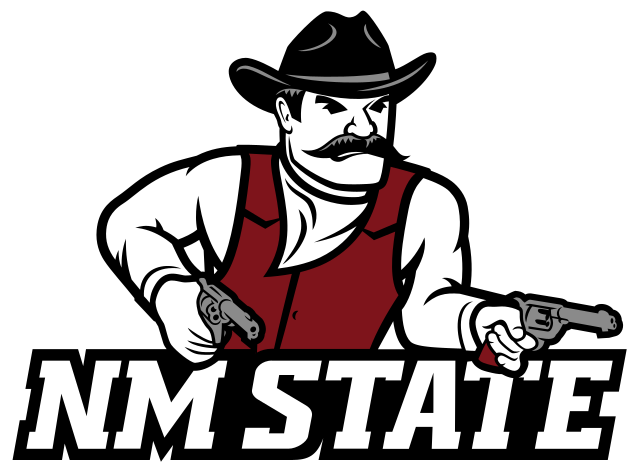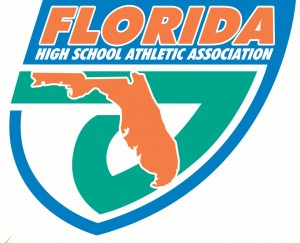Northern Burlington High School leading by example
Northern Burlington named 2014 Program of Excellence honoree
Northern Burlington County Regional High School isn’t home to many state titles, but there’s one banner hanging in the school’s gymnasium that makes Athletic Director Dan Uszaki particularly proud.
Centered among the school’s four championship flags, the last coming in 2003, is a reminder of what truly makes this athletic program special: a banner recognizing the school’s 12 sportsmanship awards.
“I’m very serious about it, and I tell all the kids that this is about winning but it’s also about sportsmanship,” Uszaki said. “There’s a fine line between a good sport and a competitive player that’s also a good sport. We’re trying to teach them to be responsible men and women.” Coach and Athletic Director’s third annual Interscholastic Sports Program of Excellence recognizes Northern Burlington (Columbus, New Jersey) this year. The award was created to honor schools for their off-the-field efforts and achievements, and no other school displayed that better in 2014 than Northern Burlington.
Coach and Athletic Director’s third annual Interscholastic Sports Program of Excellence recognizes Northern Burlington (Columbus, New Jersey) this year. The award was created to honor schools for their off-the-field efforts and achievements, and no other school displayed that better in 2014 than Northern Burlington.
That’s not to say Northern Burlington doesn’t perform well on the field and have a tremendous amount of success in doing so. The school has won league championships in at least six different sports since 2011, along with three sectional titles. Those achievements bring a lot of pride to the athletic department, but it’s hardly what motivates coaches and student-athletes to participate. Their influence stretches well beyond the scoreboard, and that’s what makes Uszaki most proud.
“Come to Northern Burlington,” he said, “and you will find people who love to be in this district, interact with the kids and improve the community.”
Community outreach
A majority of high school athletic programs create a policy stating that students or coaches participate in community service projects, but at Northern Burlington it’s something that’s embraced without strict requirements.
The list of community service efforts is a long one. During the 2012-13 school year, 39 staff and players raised $3,000 for the Children’s Hospital of Philadelphia, with the money going toward a kitchen that’s used to teach families how to prepare meals for children who suffer from food-related seizures. Last year, three teams helped collect food, clothing and cleaning supplies for teams they faced in the state tournament that had suffered from Hurricane Sandy.
The storm didn’t have much of an impact on Northern Burlington, which is nearly 40 miles from the Atlantic coast, but student-athletes were quick to help out shore communities that were affected the most.
“I had to drive north for a volleyball game, and I didn’t realize how devastating the storm was until I saw some of these places,” Uszaki said. A few of the organized fundraisers were completely driven by the players, he added.
The coaches organize their own community service events, and oftentimes it comes in the form of clinics that get children in the region acclimated with the sports they hope to someday play. Uszaki said his coaches have refused to accept payment for the events, while alumni and student-athletes even volunteer their time as clinic counselors.
 Wrestling coach Jule Dolci understands how important that is in a setting like this. Northern Burlington comprises four townships: Chesterfield, Mansfield, North Hanover and Springfield. Getting children acclimated with the high school, athletics and the staff pay dividends down the road, and it establishes a connection with residents. This school is the community’s school, and Dolci along with the rest of the athletic department want them to always remember that.
Wrestling coach Jule Dolci understands how important that is in a setting like this. Northern Burlington comprises four townships: Chesterfield, Mansfield, North Hanover and Springfield. Getting children acclimated with the high school, athletics and the staff pay dividends down the road, and it establishes a connection with residents. This school is the community’s school, and Dolci along with the rest of the athletic department want them to always remember that.
“We’ve always had that small town kind of feel and that kind of tight-knit collection of people,” Dolci said. “During the summer when you step on campus you’ll see all the camps and community outreach programs. We say this is a community, but it’s more like a family.”
That family includes the parents, who often have rocky relationships with coaches, soured by playing time or other issues related to their child’s participation. Uszaki strongly believes their involvement is essential for his athletic department, so he’s created several initiatives that welcome their presence.
Several teams have their own booster club, the school has hosted its own NCAA Eligibility Workshop conference and the athletic program created an open house for incoming students that highlighted the academic and athletic programs.
“I value the community element more than anyone,” Uszaki said. “Four sending districts presents its challenges, but we must continue to try.”
Superintendent James Sarruda said honesty and structure are two of the reasons the school developed and fostered such a healthy relationship with parents. Disagreements are inevitable, as they are at any district, but they’re few and far between at Northern Burlington.
“One thing that’s helped is we created a document for parents on how to communicate with our coaches, our expectations for them, and we’re assertive, transparent and fair,” Sarruda said. “I think that communication tool that has guided us through issues has made a great difference here because they know the expectations before the season starts.”
Education first
Uszaki wants his teams to win as much as any athletic administrator, but it’s not the sole driving force behind his department.
Northern Burlington maintains a sports participation rate of greater than 60 percent, and the GPA and graduation rate of student-athletes tends to hover higher than the rest of the student body. It’s a healthy department to be a part of, and for that reason the school district has done everything it can to keep its sports in good standing. While other district’s around the country are dropping programs to keep their budgets in line, Northern Burlington is adding.
Cutting students from teams is something that Uszaki tries to avoid whenever possible, and sometimes that means creating another team.
 “Last year when we had 90 kids show up for a middle school soccer team, I just threw up my hands and said, ‘How are we going to cut 40 kids?’” Uszaki said. “Everyone in charge recommended creating another team. It was the most simple answer, but nobody in this area had six middle school soccer teams.”
“Last year when we had 90 kids show up for a middle school soccer team, I just threw up my hands and said, ‘How are we going to cut 40 kids?’” Uszaki said. “Everyone in charge recommended creating another team. It was the most simple answer, but nobody in this area had six middle school soccer teams.”
Sarruda said as difficult as it may be, the ultimate goal at Northern Burlington is to have 100 percent participation in extracurricular activities. That puts a lot of pressure on the district to create and sustain those opportunities, but it’s a priority for the leaders involved.
The school has one of the nation’s top FFA programs, which Dolci said has become so successful that it trumps just about every other organization on campus. Whether it’s the FFA, band, cheerleading or the football team, Northern Burlington wants its students to find some way to participate outside of the classroom.
“At least 15 years ago, we decided as a district to adopt a motto, and that motto was ‘Inspire the Desire,’” Sarruda said. “What that means is if you’re going to ask what Northern Burlington is about, we want to create opportunities that inspire the desire for continued growth one student at a time.”
The district’s efforts don’t end with its students. Uszaki makes it a priority to get his coaches properly certified and allow them opportunities to grow in their profession.
More than 93 of his coaches have completed the National Federation of State High School Associations’ Fundamentals of Coaching course. A number of coaches also take sport-specific coursework to help them with their respective teams. Uszaki said his coaches take it upon themselves to seek out the opportunities and have even requested permission to get their assistants certified.
Uszaki takes steps to advance his own knowledge as an athletic director, taking several leadership training courses through the National Interscholastic Athletic Administrators Association.
Professional development is a privilege held in high regard at a majority of school districts, but the trick these days is making it viable in an economy that’s squeezed athletic budgets and forced administrators to focus on the bare essentials. Clinics and conferences come with travel expenses that most departments can’t afford, but there is a growing number of opportunities locally and online.
The most progressive athletic departments view professional development as a priority. To advance student-athletes and the programs they’re involved in, it only makes sense to improve the abilities of their leaders.
Teaching sportsmanship
The sportsmanship banner that hangs inside the Northern Burlington gymnasium was something Uszaki created. The unspoken message is the attitude and class with which you compete means just as much as the four state championships.
That’s not rhetoric. Uszaki and others at the district speak at length about their student-athletes and how they’re preparing them for something greater than the game. Winning conference and state championships is a goal, but it’s secondary to the lessons that come with playing sports and being part of the program — problem solving, teamwork, respect.
The New Jersey Interscholastic Athletic Association has recognized Northern Burlington a dozen times for its sportsmanship. Uszaki said the award encompasses all the values most important to his department.
“Throughout the year, I receive several notes and messages related to the sportsmanlike conduct of our players, coaches and fans from other competing schools, athletic directors, referees and others,” Uszaki said. “Like any crowd, our kids and fans can get emotional, but we are constantly striving to create an environment where we push for positive recognition of all teams that come through our programs.
“It is a constant effort, and the need to retrain players and fans on values is something that I continue to push each year.”
Last year, Uszaki revised the unsportsmanlike procedures at Northern Burlington. In the rare occurrence that one of his student-athletes is ejected from a game, they are required to meet state guidelines and participate in a meeting with the coach and athletic director before they are allowed to return.
The process includes an “unsportsmanlike questionnaire” made up of questions to help prevent any future misconduct. It must be signed by the athlete, parents, head coach and the athletic director.
That illustrates how much Northern Burlington values sportsmanship and the positive development of its student-athletes. It all circles back to the school’s mission, which is to create outstanding leaders and embed itself as a valued member of the community. With everything it has done over the last several years, there’s no reason to think it’s not succeeding.
“I’m in my 22nd year, and one thing I’ve known from day one is the community has a sense of pride here and I don’t know that too many superintendents can say that same thing,” Sarruda said. “I’ve worked in different districts from Connecticut to New Jersey. We’re a regional school that services four communities, but we take on the profile of a community and bring them all together.
“One of the ways that happens is through athletics.”





